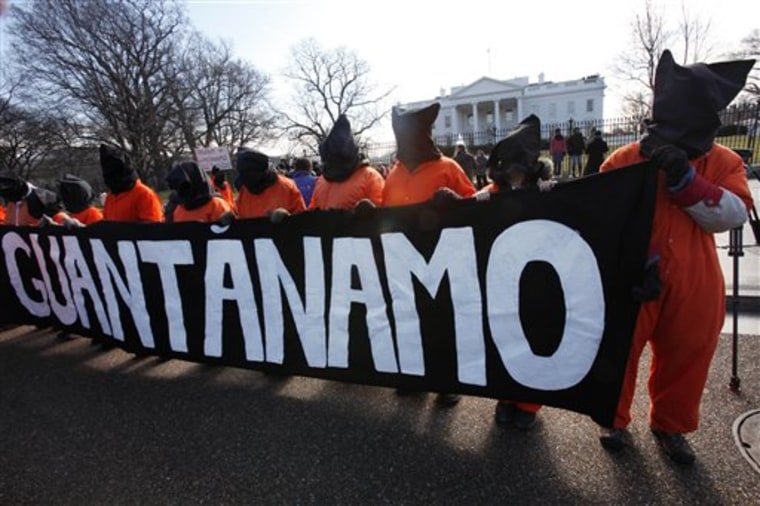As President Barack Obama neared his self-imposed deadline to close the Guantanamo Bay prison, the Justice Department offices of the terrorist detention task force were bustling — not with lawyers but construction workers tearing apart the walls, ripping out any trace of the secretive work, though Obama's goal is still far off.
The staffers were gone, having completed recommendations on detention policy. This Wednesday, the Guantanamo task force made its final recommendations for all of the 198 remaining detainees awaiting transfer, trial or further detention.
Attorney General Eric Holder has reviewed the bulk of those recommendations and decided that the most feared detainee — the self-declared mastermind of the Sept. 11, 2001, attacks Khalid Sheikh Mohammed — and four henchmen should face trial in New York.
For all that work, the Obama administration is still struggling to find the political muscle, diplomatic dexterity and cash from Congress to implement those tough, often unpopular decisions about the remaining detainees.
One-year mark arrives Friday
As one of his very first acts as president, Obama signed an executive order to close the military prison for terror suspects within a year. The one-year mark arrives Friday, and he will miss it by a wide margin, likely a year or more.
He has not offered a new deadline.
Unless he decides to change course, to close Gitmo the president must still find support in Congress to pay for a super-secure prison in Illinois for some of the detainees he wants to continue holding. He must also get additional money, likely hundreds of millions of dollars, to provide extra security to put some suspects, including Mohammed, on trial in federal courts.
Since Obama took office a year ago, more than 40 detainees have been removed from the naval base in Cuba — sent off to their homelands or to other countries. If the administration cannot quicken that pace, it would take until a hypothetical second Obama term to actually empty the site.
But the recent Christmas bombing attempt of a Detroit-bound airliner only gave further fuel to those urging the president to apply the brakes to the prison closure.
The young Nigerian accused in that attempt allegedly told investigators he was trained by al-Qaida operatives in Yemen.
That detail has huge implications for closing Guantanamo, where about 90 — or nearly half — of the remaining detainees are Yemenis, many with no clear place to go even if senior administration officials decide they can be released.
Fresh troops for terror?
U.S. officials are increasingly worried that the group that claimed responsibility for the bombing attempt, al-Qaida in the Arabian Peninsula, is so firmly entrenched in parts of that country that sending detainees back to Yemen could provide fresh troops to the terrorists.
The Obama administration, which sent a group of Yemenis home from Guantanamo just days before the failed airliner bombing, has halted any further transfers to Yemen for the near future.
Len Goodman, a Chicago lawyer who just returned Tuesday from a visit to the prison, said the delays have only embittered his client Shawali Khan, an Afghan detainee who was captured in 2002 and has long claimed he is innocent.
"His level of frustration is greater than I've ever seen it," said Gotheodman. "Everyone had high hopes for Obama, but sadly I think nothing has changed from Bush to Obama, except the conditions are better inside for the detainees. But all in all, it's just promises made and promises not kept."
The president, however, "is as committed today to closing the detention facility at Guantanamo Bay as he was when he was sworn into office," said White House spokesman Ben LaBolt.
The high-security military prison, the administration argues, actually weakens national security because it serves as a recruiting tool for terrorists and undermines the United States' moral authority in combatting such killers. Critics of the closure plan, principally Republicans, say bringing detainees to the U.S. to face trial or shipping them overseas only increases the risk of attacks.
Still others are urging the president to try new tactics — such as creating a new type of court proceeding combining civilian trials and military commissions.
Glenn Sulmasy, a law professor whose book "The National Security Court System," argues for such combination courts, said the president's difficulties in the past year have come mainly from Congress and an alternate approach could overcome that resistance.
"I think the administration took the right step to say they're going to close it," said Sulmasy. "But if you have a hybrid warrior fighting in a hybrid battlefield, it seems logical to produce a hybrid court."
